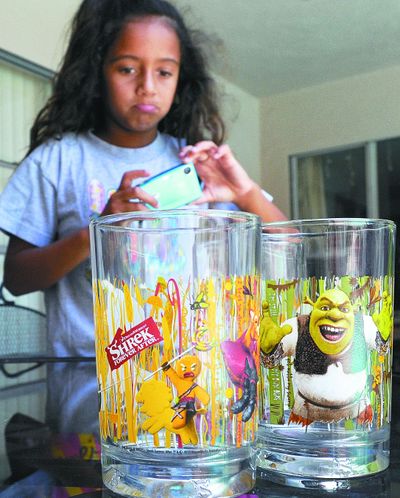‘Shrek’ glasses going over like a lead balloon
Cadmium-tainted glasses the latest recalled item to leave parents throwing up their hands in frustration

Lorena Ortiz worries about toys, jewelry – and now “Shrek” glasses – getting recalled because of toxic metals.
With two small children at home, Oritz, of Fort Worth, Texas, worries about products that should be safe for them to use.
“We keep hearing about this more and more often,” she said. “They should check to make sure it’s safe. It’s a responsibility they have.”
McDonald’s is the latest company to pull items off shelves, in this case 12 million “Shrek”-themed glasses. The company on June 4 asked customers to stop using the glasses and is offering refunds.
The Consumer Product Safety Commission said that cadmium was found in the painted design and that “long-term exposure to cadmium can cause adverse health effects.”
That comes on the heels of other items restricted because of lead concerns, ranging from Miley Cyrus necklaces and bracelets pulled by Walmart last month to dirt bikes and recreational vehicles for youths restricted last year because of a federal rule geared to keeping lead-filled toys out of children’s hands and mouths.
“There’s a concern,” said Luis Ortiz, Lorena’s husband. “It’s getting unsafe for little things that should be safe.”
Health concerns
A child who consumes significant levels of lead can develop brain damage, kidney damage, colic, anemia and muscle weakness, according to the Centers for Disease Control and Prevention.
Cadmium, a byproduct of smelting metals such as lead and zinc, is used in products including paints, plastics and rechargeable batteries and is found in cigarettes.
Low levels are in water, air and foods such as fruits and vegetables that may be grown in soil that has cadmium.
“Cadmium is very carcinogenic,” said Stathis Meletis, professor and chairman of materials science and engineering at the University of Texas at Arlington.
“A child can touch it, and it can transfer from the child’s hands, if they don’t wash their hands, into the body.”
Long-term exposure to cadmium can cause problems in brain development for the very young and lead to kidney failure or bone softening. Anyone with concerns that a child has had lengthy exposure to cadmium should contact a doctor, Meletis said.
In 2008, Congress passed the Consumer Product Safety Improvement Act, limiting the amount of lead allowed in toys or products for children to 600 parts per million.
That led to the restriction of dirt bikes and even older children’s books printed with ink that contained higher-than-allowed levels of lead.
As for cadmium, no more than 75 parts per million are allowed in paint for children’s toys.
Voluntary recall
In the McDonald’s case, a pigment in paint used on the “Shrek: Forever After 3D” collectible glasses contained cadmium.
The 16-ounce glasses came in four designs – Shrek, Fiona, Puss n’ Boots and Donkey – and had been sold for $2 each at McDonald’s restaurants nationwide since last month, according to the safety commission.
They were manufactured by ARC International of Millville, N.J.
“We believe the ‘Shrek’ glassware is safe for consumer use,” McDonald’s USA spokesman Bill Whitman told the Associated Press.
“However, again to ensure that our customers receive safe products from us, we made the decision to stop selling them and voluntarily recall these products effective immediately.”
The cadmium level came to light after someone tested the glasses and told U.S. Rep. Jackie Speier, D-Calif. Speier has proposed federal legislation to strictly limit cadmium in jewelry.
McDonald’s officials said on their website that they had an accredited third-party laboratory test the glasses before they were sold to the public and that those results showed that the glasses were “in compliance with all applicable federal and state requirements at the time of manufacture and distribution.”
But company officials said they decided a voluntary recall of the glasses would be appropriate.
Mia Sowell of Fort Worth doesn’t have any “Shrek” glasses but wouldn’t be especially concerned if she did.
“I try not to worry about it,” said Sowell, who has a 6-year-old son. “I think these days people are overly worried about things. I was born in 1970, and I’m sure I had a lead-based crib.
“I think we are making (children) too soft, worrying about every little thing,” she said. “If there’s no significant problem, I don’t worry about it.”